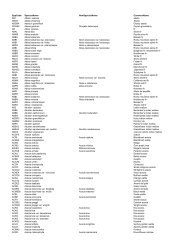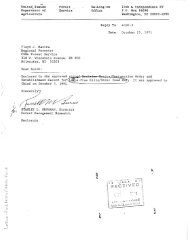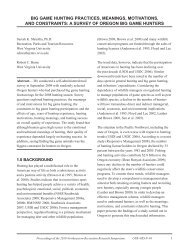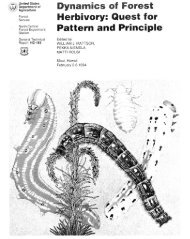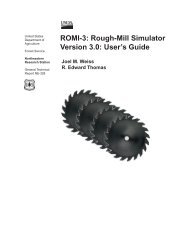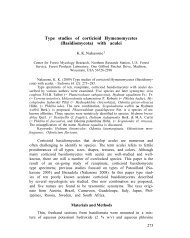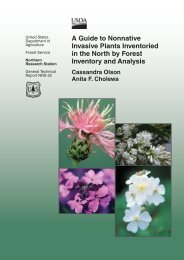Proceedings of the 2009 northeastern recreation research symposium
Proceedings of the 2009 northeastern recreation research symposium
Proceedings of the 2009 northeastern recreation research symposium
Create successful ePaper yourself
Turn your PDF publications into a flip-book with our unique Google optimized e-Paper software.
CONSTRAINTS AND BENEFITS OF CHANGING THE DISTRIBUTION PROCESS<br />
FOR RECREATION SPECIAL USE PERMITS IN THE U.S. FOREST SERVICE<br />
Jessie Meybin<br />
School <strong>of</strong> Recreation, Parks and Tourism Resources<br />
Division <strong>of</strong> Forestry<br />
West Virginia University<br />
jmeybin@mix.wvu.edu<br />
Robert Burns<br />
West Virginia University<br />
Alan Graefe<br />
Th e Pennsylvania State University<br />
James D. Absher<br />
U.S. Forest Service<br />
Abstract.—A signifi cant policy change governing<br />
<strong>recreation</strong> Special Use Permits on U.S. Federal lands<br />
was implemented in October 2008. Th e changes may<br />
have a major impact on current and potential <strong>recreation</strong><br />
users, members <strong>of</strong> local communities, and existing<br />
outfi tter/guide services. Th is paper presents fi ndings from<br />
interviews with permit distribution supervisors about<br />
changes in <strong>the</strong> permit allocation process. Th is <strong>research</strong><br />
is one part <strong>of</strong> a larger project focused on developing<br />
a universal but fl exible framework by which permit<br />
distribution <strong>of</strong>fi cials can allocate and monitor <strong>recreation</strong><br />
Special Use Permits.<br />
1.0 INTRODUCTION<br />
Th e regulation <strong>of</strong> use has been a concern since <strong>the</strong> fi rst<br />
public lands were created in <strong>the</strong> United States, and it<br />
continues to be a constant issue for land managers today.<br />
Visitor use has many subcategories, such as individual<br />
versus group use, and monitoring eff orts also focus on<br />
<strong>the</strong> people or services that bring people onto public<br />
lands. Federal regulations are in place for ecological<br />
management, but it is up to individual land managers to<br />
know <strong>the</strong> specifi c ecological and social carrying capacities<br />
<strong>of</strong> <strong>the</strong>ir area, and to develop a customized framework for<br />
managing and monitoring use (Holdgate 1984, Legore<br />
1984, Watson et al. 2000, Manning and Lawson 2002,<br />
Collins and Brown 2007).<br />
As <strong>of</strong> October 2008, new policies require changes to <strong>the</strong><br />
<strong>recreation</strong>al Special Use Permitting process that applies to<br />
outfi tter and guiding services. Th ese organizations, which<br />
bring groups <strong>of</strong> people onto publicly managed lands,<br />
hold one <strong>of</strong> two types <strong>of</strong> Special Use Permits (SUPs):<br />
priority or temporary. Priority permit holders are usually<br />
those whose business or service focuses and/or takes place<br />
almost exclusively on public lands. Priority use permits<br />
tend to have longevity and allow many consecutive days<br />
<strong>of</strong> use. For example, a whitewater rafting business with<br />
an equipment store and guiding service would be both<br />
an outfi tter and guide service, and would need a priority<br />
use permit. Temporary permit holders have fewer days<br />
<strong>of</strong> use, usually only for a specifi ed time period (Brown<br />
2008). Recreation events, such as bike races or Boy<br />
Scout camps, would receive a temporary permit. Recent<br />
changes to <strong>the</strong> Special Use Permitting process will aff ect<br />
both types <strong>of</strong> permit holders.<br />
Priority use permits will last for 5 years instead <strong>of</strong> 10;<br />
<strong>the</strong>y will be monitored more strictly for quality <strong>of</strong> service<br />
and percentage <strong>of</strong> allotted days actually used. Th e main<br />
drawback for priority permit holders will be <strong>the</strong> loss<br />
<strong>of</strong> some fl exibility about which days <strong>the</strong>y can use <strong>the</strong><br />
area. Th is change will have <strong>the</strong> biggest eff ect on priority<br />
outfi tters/guides that operate during <strong>the</strong> shoulder season<br />
(between <strong>the</strong> peak and <strong>of</strong>f -peak seasons) and depend<br />
on <strong>the</strong> fl exibility <strong>of</strong> use days when <strong>the</strong> wea<strong>the</strong>r and<br />
<strong>the</strong> number <strong>of</strong> users (clients) fl uctuate considerably.<br />
Temporary use permit holders will also be strongly<br />
aff ected since <strong>the</strong> fi rst step <strong>of</strong> <strong>the</strong> changes is to cancel<br />
all existing temporary permits. Temporary permits will<br />
<strong>the</strong>n be allotted on a fi rst-come, fi rst-served basis from a<br />
temporary use pool. Th erefore, temporary users that want<br />
to request many use days will have an incentive to apply<br />
for a priority use permit, and o<strong>the</strong>r temporary users will<br />
have to compete against each o<strong>the</strong>r for use days. Th is<br />
process gives everyone a fair chance at use access and<br />
increases overall opportunities to provide a greater variety<br />
<strong>of</strong> activities. In addition to aff ecting permit holders, <strong>the</strong>se<br />
changes will aff ect members <strong>of</strong> <strong>the</strong> general public who<br />
use <strong>the</strong>se resources and resource services.<br />
<strong>Proceedings</strong> <strong>of</strong> <strong>the</strong> <strong>2009</strong> Nor<strong>the</strong>astern Recreation Research Symposium GTR-NRS-P-66<br />
199




